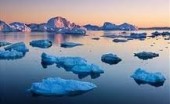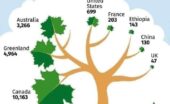Re Ian Bremmer 'Could third-party candidates upend the 2024 US election?' 3 April The current political movement in the USA…
Wednesday Night #1326
Written by Diana Thebaud Nicholson // August 1, 2007 // Biofuels, Reports, Wednesday Nights // 4 Comments
1 August 2007
It is indeed the Dog Days of Summer and we feel appropriately listless (despite Peter Trent’s avowal that we are never list-less), not sure at all what topics are timely, or whether they will be a day or two hence. It is extraordinary that despite these sentiments of disconnectedness, the recent Wednesday Nights have produced fascinating, thought-provoking discussions on a range of important topics like environmental change & security, Arctic sovereignty, China, the International Criminal Court and, yes, the stock market and world economy, all proving that we may be listless, but our Wednesday Nighters certainly are not. There has been the added pleasure of some returnees to the fold (Cleo, Kimon, Marion Canute, Noah Weisbord and Reg Weiser) to diminish our sense of loss with the departure of Anne Sophie Coleman.
So, it is incumbent upon us to overcome our lassitude and offer a few tidbits for your consideration, in the hope that they will pique your interest and prompt you to join us in the flesh, or in spirit.
— Furthering our discussion of Arctic sovereignty, the Christian Science Monitor sounds the alarm: “As icecaps melt, Russia races for Arctic’s resources. This week, it stakes territory in an internationally administered area said to contain vast oil and gas reserves.” The article goes on to note that “Canada, which has the second-longest Arctic coastline, is currently conducting a $70 million project to map the seabed on its side of the Lomonosov Ridge, in what experts suggest is a prelude to making its own submission to the UN.”
— On the subject of Iraq, a topic we have more-or-less given up on because there seems little more to say and none of it good, we call to your attention an incredibly positive piece in, of all places, the New York Times. In an article headed “A war we just might win”, Michael O’Hanlon and Kenneth Pollack put forward the startling notion that “We are finally getting somewhere in Iraq, at least in military terms. As two analysts who have harshly criticized the Bush administration’s miserable handling of Iraq, we were surprised by the gains we saw and the potential to produce not necessarily “victory” but a sustainable stability that both we and the Iraqis could live with.”
For another view and market commentary, we commend the Laurel Comment, an often worthwhile blog to which John Budden introduced us
— We are somewhat bemused by the announcement that Condoleezza Rice and Defense Secretary Robert Gates are touring the Middle East promising weapons for allies, saying this would help counter Al Qaeda, Hezbollah, Syria and Iran. It does seem to us that the more weapons proliferation, the less likely there is to be general peace in the region.
— It is odd that given Wednesday Nighters’ devotion to news in all its forms, we have not discussed in any depth the takeover of the Wall Street Journal by News Corporation. Of course the deal is for Dow Jones & Co. – not simply the WSJ, but the focus of media pundits is on that unique publication. Now the deal is done and the informed opinionators will accelerate their analyses of what Murdoch’s strategy will be.
— While the floods in the UK and the appalling heatwave in Europe has grabbed most of our headlines, China is undergoing calamitous floods with far less fanfare, millions of acres of crops have been destroyed affecting 119 million people.
— In another segue to a previous discussion , ex-Khmer Rouge prison chief Kang Kek Ieu, also known as Duch, has been charged with crimes against humanity by the Extraordinary Chambers in the Courts of Cambodia, a UN-backed tribunal.
Now we have found our rhythm there is actually a lot more that we would be happy to write about including encouraging noises of conciliation between Armenia andTurkey, the withdrawal after 38 years of the British Army from Northern Ireland , the possible final meltdown of Robert Muagbe’s regime, the UN Security Council agreement to send 26,000 more troops and police to Darfur – where will they get them? – however, better that we leave room on the agenda for your suggestions.
In the meantime, we cannot overlook some important local items:
Greenpeace calling the Québec government on the relaxation of environmental regulations for farmers which is a major contributing factor to the outbreak of blue-green algae and the closing of our lakes. We look forward to hearing what Environment Minister Line Beauchamp has to say in response.
The winding down of Pierre Marc Johnson’s enquiry with finger-pointing galore
Yet another delay announced for construction of the Montreal Children’s Hospital after the Quebec goverment decided to have it built as part of a public-private partnership.
The acquittal of John Felderhof of insider trading charges after selling $84-million of Bre-X Minerals Ltd. shares in 1996, before the world learned there was virtually no gold at Bre-X’s Busang site in Indonesia.
Finally, who could ignore Saturday’s announcement of the engagement of Peter Phillips to Autumn Kelly – you DO know who they are? She’s from the City of Pointe-Claire. Poor Mayor Tremblay must be gnashing his teeth.
The Report
The Chilcoot (Klondike) Trail
The evening started on an unusual and adventurous note as Catherine Gillbert gave a riveting description of her recent trip to Alaska and the Yukon, notably her hiking experience on the Chilcoot Trail.
Although Alaska was sold by Russia to the United States in 1867 [for $7,200,000], few Wednesday Nighters are aware of the strong Russian influence that is still evident. The native Indians are Russian Orthodox, the Churches still exist and services are conducted in Tlingit, an indigenous language.
The Chilcoot Trail crosses the international boundary between the United States (Skagway) and the Yukon and provided the shortest, cheapest access to the Klondike for prospectors during the Gold Rush (1896-99) prior to the completion of the railway. This was one of the key trails for the Gold Rush, used during the winter of 1883-84 by some 40,000 people, each of whom brought one ton of supplies to enable them to survive for a year in the Yukon. In the end, it seems that nobody made the dreamed-of fortunes from gold discoveries, while the some-300 people who did prosper did so through providing goods and services to the luckless prospectors.
Today, the Trail, designated as part of the Klondike Gold Rush International Historical Park, is jointly administered by the U.S. and Canadian national parks services. Catherine was extremely impressed by the quality of the service offered by the Canadian Park Rangers and the extreme care taken of the environment.
She noted that last year Alaska had record snowfalls, confusing those observers who do not fully comprehend that the effect of global warming is increased precipitation and therefore, if it is cold, there will be more snow.
Russia’s claims to the Arctic (continued)
In the great traditions of the Scandinavian saga, the Russian expedition is now poised to lay claim to the Lomonosov Ridge as part of Russia’s continental shelf. Whether this should be viewed as a negotiating ploy or a genuine flexing of the Russian Bear’s claws remains to be seen. Meanwhile, The “New Government” of Canada announced in June that it was devoting $150 million over six years to a research programme in the context of the International Polar Year. Part of the programme is to focus on climate change impacts and adaptation
[Editor’s note: on Thursday, August 2, it was reported that Russia symbolically staked its claim to billions of dollars worth of oil and gas reserves in the Arctic Ocean yesterday as two mini-submarines reached the sea bed more than two and a half miles beneath the North Pole.
In a record-breaking dive the two craft planted a one metre-high titanium Russian flag on the underwater Lomonosov Ridge, which Moscow claims is directly connected to its continental shelf. The Guardian offers a good background piece].
As the BBC points out , it is not only Canada and Russia who have disagreements over the Arctic. “The US and Canada argue over rights in the North-west Passage, Norway and Russia differ over the Barents Sea, Canada and Denmark are competing over a small island off Greenland, the Russian parliament is refusing to ratify an agreement with the US over the Bering Sea and Denmark is claiming the North Pole itself.” Thus, in the opinion of Wednesday Night, the only certainty is that the international decision-making process will be a long, drawn-out affair that could go on for as much as 40 years.
Energy
As the race for sovereignty over the polar region is precipitated by the promise of oil, gas and mineral rights worth trillions of dollars, in the interim, New Brunswick and Ontario are opting for new nuclear energy plants for reliable supply of electricity. The next hydro project in Northern Quebec will deliver electricity at 5 cents/kwh; operational nuclear plants that are fully amortized are delivering at 2-3 cents. One criticism of new nuclear plants is the amount of carbon emissions generated by the construction of the facility. But wind power has an equivalent amount of emissions (though without decommissioning costs) and requires a back-up system. Wind farms, under the very best of conditions can only deliver power 35% of the time. The question of how/where to best (most safely) store nuclear waste is still the subject of debate, but there are alternative solutions today and surely better ones will be developed in the near future.
We must, however, bear in mind that there is no global prescription and what will work in the developed world is not applicable in other nations or regions. These parts of the world have already demonstrated success in small-scale solutions like solar ovens and the brilliant “playground solution” that allows kids to pump water while playing.
Biofuels are also controversial. Not only are they less efficient than other available fuels, but in developed nations such as Canada, the amplified demand for corn (which has the worst environmental impact) and ill-advised western government subsidies have caused farmers to shift their fields to make room for corn, decreasing the supply of other grains, such as soybeans and wheat and inevitably affecting food prices. There is an argument for countries like Brazil where the land used for sugarcane for ethanol production is of no ecological value. The international community is now working to develop standards for the third and fourth generation biofuels that will ensure that they have a positive carbon footprint. The Convention on Biological Diversity (CBD) is not fundamentally opposed to biofuels – or Genetically Modified Organisms, commonly referred to as GMOs – provided such standards and safeguards are internationally agreed.
Biofuels do pose severe risks to the environment if managed carelessly, but they also have the potential to reduce greenhouse gas levels, produce local sources of energy, and restore rural economies. Biofuels will not be able to replace fossil fuels in the future; however, with climate warming, and the cost increases in fossil fuels, biofuels will have to become a significant part of the long-term energy outlook for the planet.
One nuclear proponent emphasizes that the first, cheapest, easiest and most obvious policy is Conservation – we could save 30% of the energy we use today without affecting our lifestyles. This can be accomplished by changing not what we do, but the way we do it, e.g. the way we transport goods, the way we make our cars, production methods, etc.
Rupert Murdoch & media issues
Common wisdom has it that as Rupert Murdoch is a smart businessman, he is unlikely to do anything to damage the Wall Street Journal or Barron’s brand other than to make it more accessible to broader readership, while aggressively competing for the New York Times’ advertising, market share and standing. Amidst all of the wailing and gnashing of teeth over the acquisition, it must be remembered that the Dow Jones Corporation had the lowest return over the past 20 years of any media conglomerate, so this represents a real business opportunity.
A more generic question is whether there is a complete disconnect between those (intelligentsia) who report and write the news and the vast number of readers and potential readers whose values are vastly different. A corollary is that in Canada, while the National Post is avowedly conservative and to the Right in its thinking, other ‘mainstream’ national media have a less obvious liberal atheist bias. A heated discussion of the role of believers/nonbelievers, declared and undeclared religious affiliations, and their role in the media and in society followed.
The underlying issues are perhaps not so much the role of the publisher, editor or reporter, but the concentration of ownership across the media, and the role of the reader in sifting through the declared and undeclared biases, reading – or viewing – a sufficiently broad sampling of commentary and arriving at conclusions based on his or her own analysis. Given the concentration of media ownership, this requires effort on the part of the audience to go further afield to seek out other information, news and views. One Wednesday Nighter pointed to the Internet as the solution, stating that, at least in the case of CBC, the greatest number of downloads are not of news, but of ideas. In support of this statement is the fact that one of the most downloaded [AWFUL adjective] sites (especially by young Canadians) is Quirks & Quarks, which is very encouraging, .




4 Comments on "Wednesday Night #1326"
Russia’s dramatic dive to the bottom of the Arctic Ocean this week to drop off the Russian flag was exactly what Foreign Affairs Minister Peter MacKay called it: a brazen, old-fashioned attempt to grab territory.
The harrowing feat will ultimately turn out to be more stunt than serious claim, we believe, but it should sound a warning note to Canada and others that Russia plans to be at the forefront of the race for the enormous deposits of minerals that could lie under the ocean, as well as for rights to shipping lanes and fishing rights.
The Gazette http://tinyurl.com/2bd3kl
People who know Mr. Murdoch expect that after the Dow Jones deal goes through in about three months, he’ll focus on assuring the Journal staff that he won’t destroy the paper. But enormous changes will follow down the road.
“The paper you’ll see in five years time will be quite different from what you’re looking at today,” says Ken Chandler, a media consultant and former Post editor in chief who worked for Mr. Murdoch for nearly 30 years. “It’ll have a wider readership, and clearly the people who should be most worried about this should be the Times, because that’s the competition.”
http://tinyurl.com/2z7pt
“Biofuels do pose severe risks to the environment if managed carelessly, but they also have the potential to reduce greenhouse gas levels, produce local sources of energy, and restore rural economies. Biofuels will not be able to replace fossil fuels in the future; however, with climate warming, and the cost increases in fossil fuels, biofuels will have to become a significant part of the long-term energy outlook for the planet.”